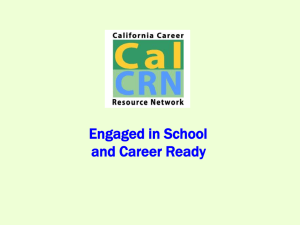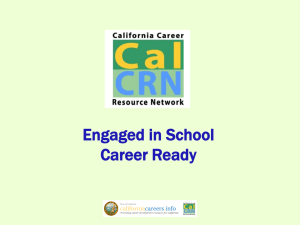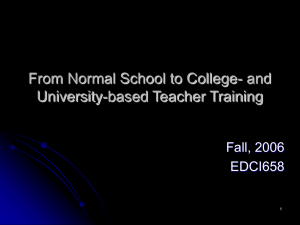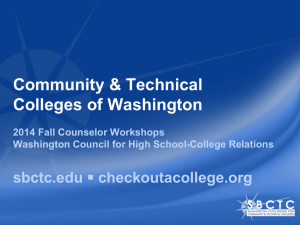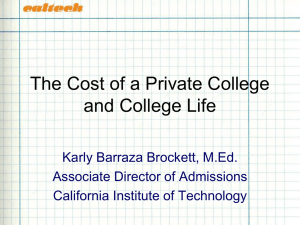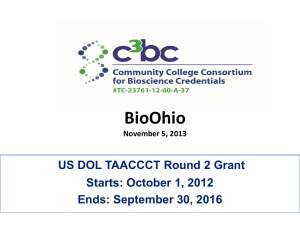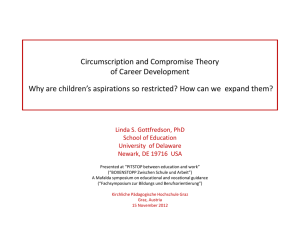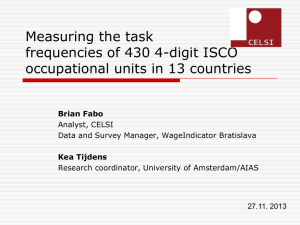Mission College and Our Community
advertisement
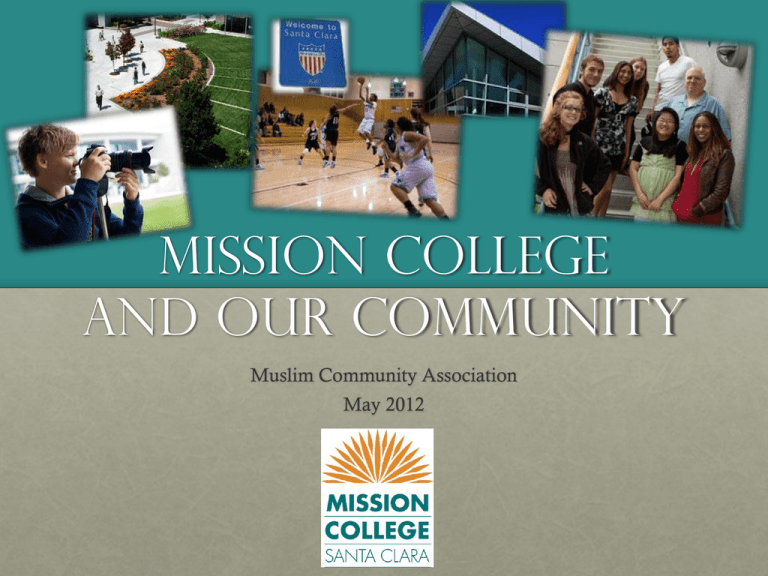
Mission College and our Community Muslim Community Association May 2012 Today’s Community College • Open Access—practicing the ideal of education for all • Offering flexibility in education • Part-time students • Evening, weekend and short-term courses, distance education • Educating Community Leaders • 80% of firefighters, law enforcement officers and EMTs are credentialed at community colleges • 70% of nurses in California received their education from community colleges • Transfer students from community colleges account for 48% of University of California’s bachelors degrees in science, technology, engineering, and math Today’s California community Colleges • Largest system of higher education in the world • 112 community colleges across the state • Serve over two and a half million students each year (2,758,081 individual students in 2009-10) • The most affordable option for higher education Cost to Students: Undergraduate Fees, 2011-12 Resident Fees Nonresident Fees CCC System $1,080 $6,409 CSU System $6,422 $17,582 UC System $13,218 $34,164 Today’s California community Colleges • Important Entry Point for Higher Education • 54% of CSU Graduates and 28% of UC Graduates in 2009-10 began their college years at a California Community College • Transfers in 2009-10 from CA Community Colleges • • • • To University of California 14,690 To California State University 37,651 To In-State Private Colleges/Universities 23,584 To Out of State Colleges/Universities 17,025 CCC system in Context Per-Student Funding by Education System, 2009-10 $ Per Student K-12 System $7,957 CCC System $5,376 CSU System $11,614 UC System $20,641 (amounts include state Gender Fund, local property tax, student fee revenue, and federal stimulus funding, but not STRS or lottery funds.) Today’s Mission College • Founded in 1977 • Service area includes portions of Santa Clara and Santa Cruz Counties, with students from throughout Silicon Valley • Offers more than 70 academic, vocational and fundamental skills programs • Serves approximately 12,000 students each term Enrollment trends • Close to 65% of students come from outside the official college service area • Shift following the tech bubble swing in the early 2000s • Reduction in number of employed workers coming for specific tech-related skills • Increasing number of traditional students coming direct from High School • Traditionally known as an “evening school,” students now attend daytime classes in greater numbers than evening • Students in daytime classes made up 46% of students in Fall 2000, 63% in Fall 2010 • Distance Learning has increased by 20% in two years Enrollment Trends • Student Headcount peaked in Spring of 2009 • Strong demand in last three years has been tempered by state mandated workload reductions Student Focus • Of all Full Time Equivalent Students (FTES) in Spring 2011: • 13.6% came from Basic Skills (nontransferable) • 80.7% came from areas Transferable to 4-year colleges and universities • In addition, 29.5% of FTES generated would apply towards Vocational Education goals About Our Students • Nearly 10% of students are new, first-time students while over 60% are returning from the prior term ENROLLMENT STATUS FALL 2010 Student Count Student Percentage First-Time Student 1,094 9.52% Continuing Student (from last term) 7,077 61.61% Returning Student (from prior terms) 1,429 12.44% Transfer (from other colleges) 839 7.30% Other / Uncollected 1,048 9.12% Student completion Mission College Student Awards 2010-2011 Awards Associate Degrees Certificates 18+ Units Certificates 6-18 Units Combined Total 574 85 12 671 Mission College Transfers to UC and CSU 2009-2010 Transfers UC System CSU System Combined Total 36 188 224 Largest Transfer Schools: San Jose State Cal State East Bay 106 52 Student characteristics • 57% Female, 42% Male (Spring 2011) • Diverse spread across age categories • 15% age 19 or younger, 14% age 50 or higher • 44% between the ages of 20 and 29 Race & Ethnicity • Richly diverse student body • 77% of students with reported race/ethnicity are nonwhite Students & Our community High School Success Rates • Only half of high school graduates are ready for a four-year college • The 4-Year Dropout Rate has improved to 11.9% from 16.1% in 2008-2009 High School Success Rates, Santa Clara County 2009-10 Graduates High School Graduates Source: California Department of Education DataQuest 16,833 Graduates with UC/CSU Required Courses 8,229 48.9% 4-Year Dropout Rate 11.9% Industry growth Santa Clara County Industries with the Fastest Anticipated Growth, 2010 to 2019: • • • • • Information, 19% Other services, 17% Education and health services, 16% Financial activities, 16% Agriculture, natural resources, and mining, 16% • Overall growth, 10% Source: Economic Modeling Specialists, Inc. 2011 Occupation growth Santa Clara County Occupations with the Fastest Anticipated Growth, 2010 to 2019: • • • • Professional and related occupations, 15% Management, business, and financial occupations, 13% Service occupations, 13% Sales and related occupations, 9% Occupations with Anticipated Declines • • • Farming, fishing, and forestry occupations, -17% Military occupations, -3% Production occupations, -1% Source: Economic Modeling Specialists, Inc. 2011 Next


